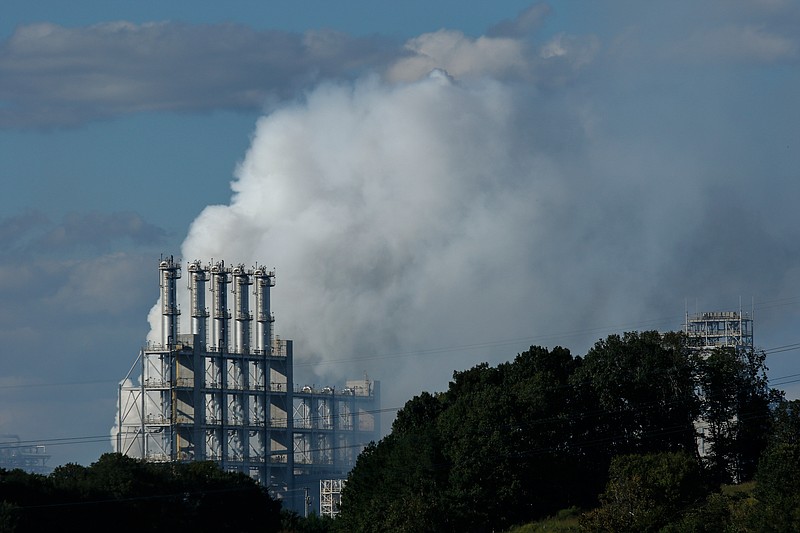We'd like to thank Wacker for its Thursday full-page letter to the community in the Times Free Press.
That letter began with an apology, sort of. Wacker apologized for "any" confusion and anxiety the community "may" have felt following "the incident last week" at the Wacker plant in Charleston.
While the letter was a good start, and something this page on Saturday sought, it was singularly lacking in all else we wanted - straight, direct and honest new answers and assurances about three chemical releases of hydrochloric acid (not a single "incident") within two weeks' time.
Each release required employees - and in one instance neighbors in a 1.5-mile radius - to shelter in place indoors with air systems shut off as emergency responders sought to stop the releases. In the largest event, there was a strong explosion that sent a cloud of hydrochloric acid high into the air. The blast and ensuing chemical release closed Interstate 75 and nearby roads for hours, forced the hours-long shelter-in-place order that included a nearby school, and sent 13 people for treatment at hospitals. Those treated included a plant worker, a firefighter, four deputies and seven local residents.
Calling this just an "incident" is at best disingenuous.
Hydrochloric acid is a colorless to slightly yellow, corrosive, nonflammable gas that is heavier than air and has a strong irritating odor. Its corrosive vapors, and inhalation of the fumes, can cause coughing, choking, inflammation of the nose, throat and upper respiratory tract, and in severe cases, pulmonary edema, circulatory system failure and death, according to the Agency for Toxic Substances & Disease Registry, a federal public health agency of the U.S. Department of Health and Human Services. ATSDR also says skin contact with the gas can cause redness, pain, and severe skin burns and eye damage. EPA rates and regulates the gas as a toxic substance.
Saying repeatedly, even in the apology, that "at no time did the chemical leak pose any harm or health concerns to the community" is both disingenuous and tone deaf. What about those folks treated at the hospital? What about those parents whose children were trapped in the nearby school?
And continually failing to answer basic questions about the plant, the blast, the chemicals, the releases, the recurrent problems and the now-clear community distrust of Wacker's plant safety is totally unacceptable.
In an interview Thursday with Times Free Press reporter Mark Pace, Wacker's Charleston site manager Mary Beth Hudson said plant officials still don't know what happened. She said a preliminary investigation will be complete next week, but it will not be released to the public.
Frankly, we don't quite know what to make of that response. Should we think of it more as the most maddening answer we've heard or as the most frightening answer we've heard?
To be clear: Accidents happen. We all know that, and we all understand that accidents are forgivable.
But stonewalling an entire community - and Hudson acknowledged to our reporter that Wacker has not talked with community neighbors - is simply mind-numbing.
A week before the blast termed by the company as "the incident," five plant workers were hospitalized with chemical burns. After the blast, plant officials finally confirmed that the same chemicals were involved.
And less than a week after the second incident, alarms at the plant went off for a third time, prompting employees on Tuesday to take shelter yet again.
But the only additional information offered on the third incident came from the Bradley County School District when officials there made a separate news release stating plant alarms were set off while work was being done on "damaged pipes with chemical residue."
"There is no threat to our schools or the community. Bradley County Safety Director and the Director of [Emergency Management] have been in contact with representatives from Wacker," the schools' statement read.
Does Wacker think this is the way to engender community trust? Or does the company simply think this is the way to keep its head down?
In the vacuum created by Wacker's lack of open communication, we and the community are left to investigate for ourselves.
Here's what we've found so far: The plant manufactures hyperpure polysilicon in the making of solar panels, but already has a spotty regulatory history.
Records from the Tennessee Occupational Safety and Health Administration show Wacker was cited for dangerous working conditions in the spring and summer of 2016 and fined $8,500. In October, a faulty gasket in a distillation device released a small cloud of chemicals, but no one was injured. Now we have three new incidents this year.
The community, too, has sought to fill the information vacuum, albeit with social media, and sometimes to exacerbate false rumors, leading emergency responders to complain at public meetings.
Chemicals often make our lives better, but they can also be dangerous.
What makes them most dangerous is pretending that danger doesn't exist and refusing to take responsibility - either for the danger itself or for the very real community concern it causes.
Wacker owes us more than an apology. Let us say again: Wacker owes us the respect of straight, direct and honest information.
